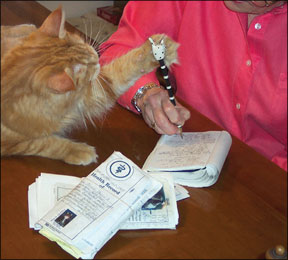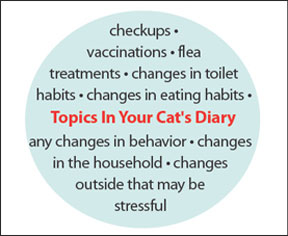If your cat kept a diary, it might read something like this: Yesterday, I slept, ate, slept some more, chased a paper ball, napped, ate again and napped. While that may describe a cats typical day, it wont necessarily help you or your veterinarian if your cat develops a health or behavior problem. “Keeping a diary for your cat is a good idea in general, but particularly when your Bev Caldwell 288 cat is ill,” says Drew Weigner, DVM, who is board-certified by the American Board of Veterinary Practitioners. Keep Track of the Basics At a minimum, you should track your cats veterinary visits, vaccinations, flea treatments and any medications your cat takes. Beyond that, record anything that is unusual for your particular pet. For example, if you change your cats diet, note the date and track changes (such as vomiting or diarrhea). Or, if your cat urinates more or less often than usual, record that in the diary. “If there is anything unusual, or if you start seeing something more often, you should take a trip to the veterinarian,” says Dr. Weigner, whose practice is The Cat Doctor in Atlanta, Georgia. If your cat exhibits any changes in behavior, you should note anything unusual thats happened in the house, such as human visitors or changes in the environment. Are strange cats hanging around outside? “Anything can act as a trigger,” says Dr. Weigner. “Keeping a journal helps separate the subjective from whats objective. If you keep a log of it, you know for sure.” Keeping a diary for your cat need not be time-consuming, and you dont need an elaborate binder. “A lot of my clients make notes on calendars,” says Dr. Weigner. A tablet in which you record the date and the occurrence in a few short sentences will suffice. Keep it 288 handy – you might tack it to your refrigerator, for instance – especially if your cat is ill and you need to track his signs on a daily basis. For the average healthy cat, day-to-day activities arent necessary to record. “When problems occur, record as much detail as possible,” says Dr. Weigner. When dealing with something nebulous, ask your veterinarian what to record. For example, a limp that comes on after your cat gets up from a nap might be a sign of arthritis. “A diary gives the veterinarian ideas of what to look for,” says Dr. Weigner. “When something is wrong, the more information to provide the veterinarian, the better.” If you must leave your pet in the care of a sitter, ask the sitter to maintain the diary in your absence. “When you come back, youll know what your cat has done and that your cat has received great care,” says Dr. Weigner. If your cat becomes ill, you can fax or mail your journal to your veterinarian before you take your cat for the appointment. That way your veterinarian can look it over and spend time thinking of what questions to ask. “Overall, its really valuable for cats that are sick,” says Dr. Weigner. 




